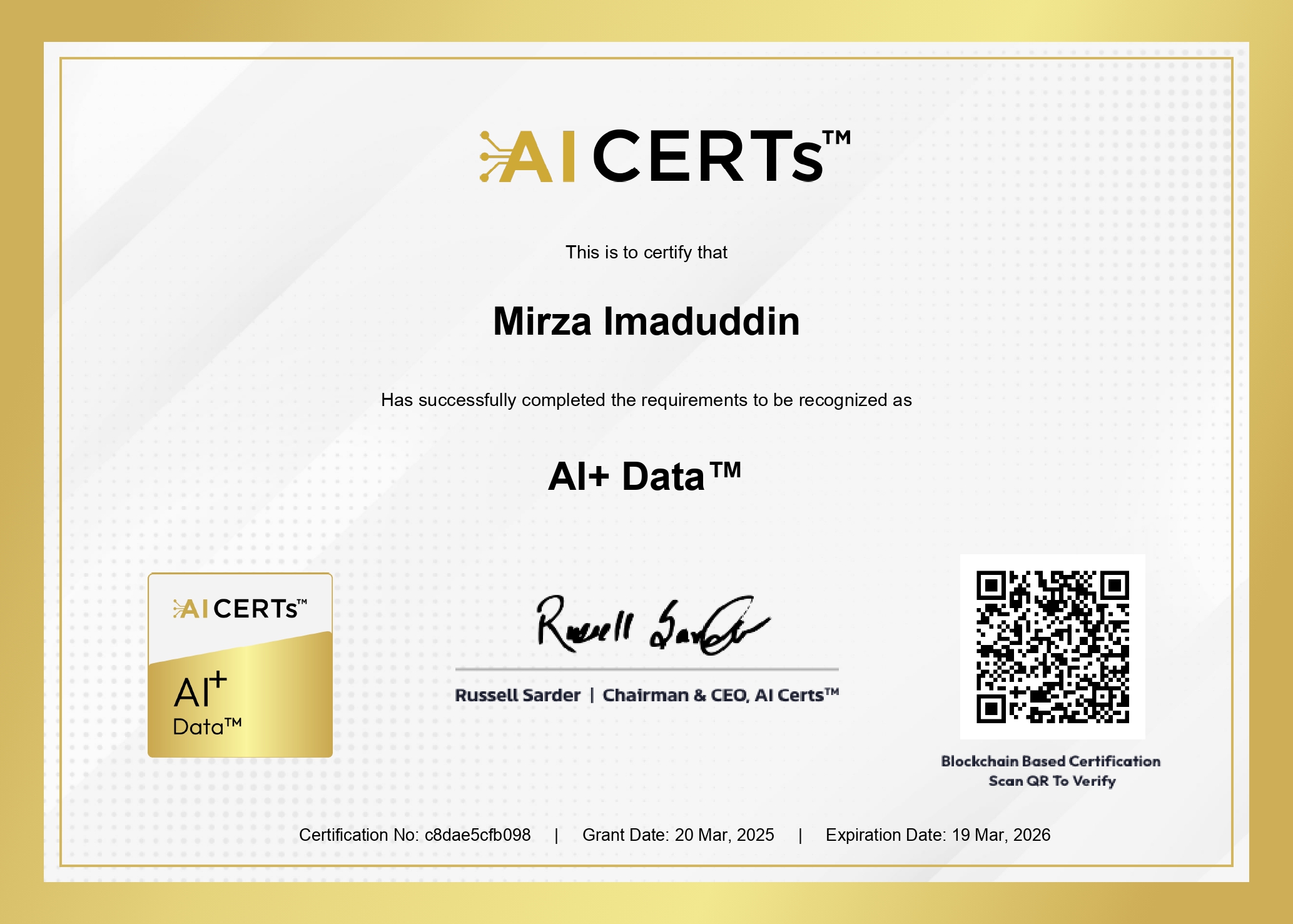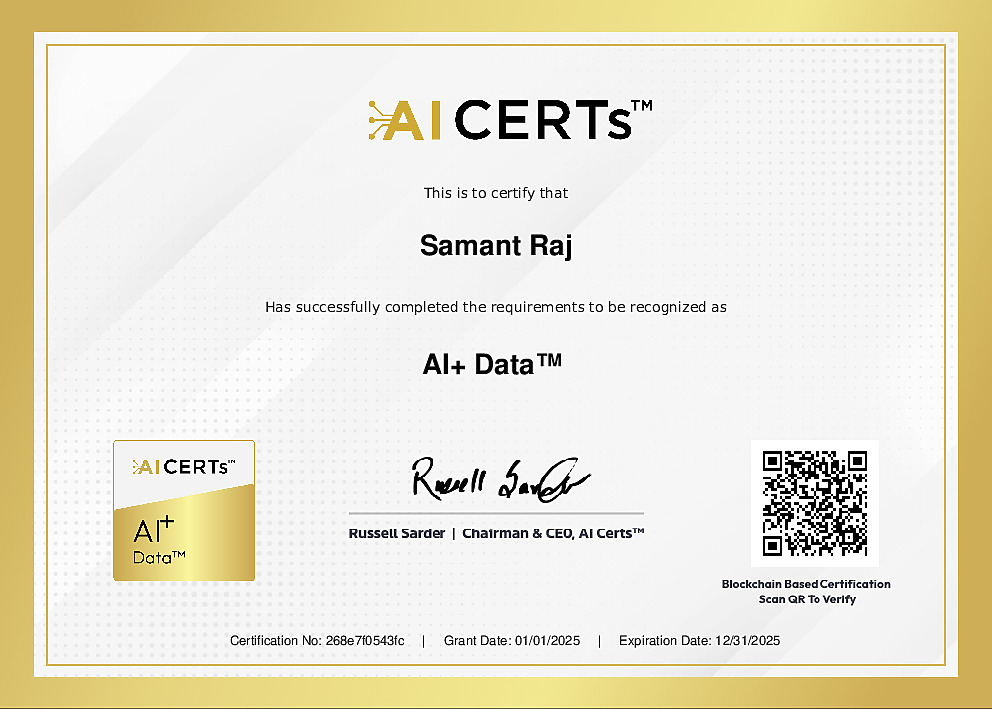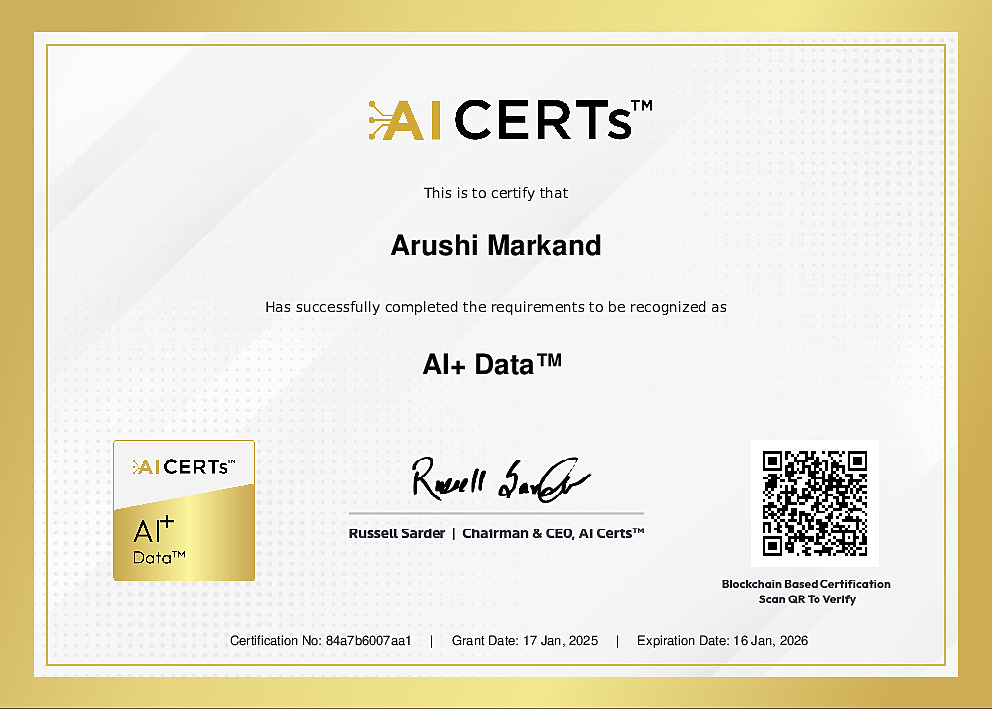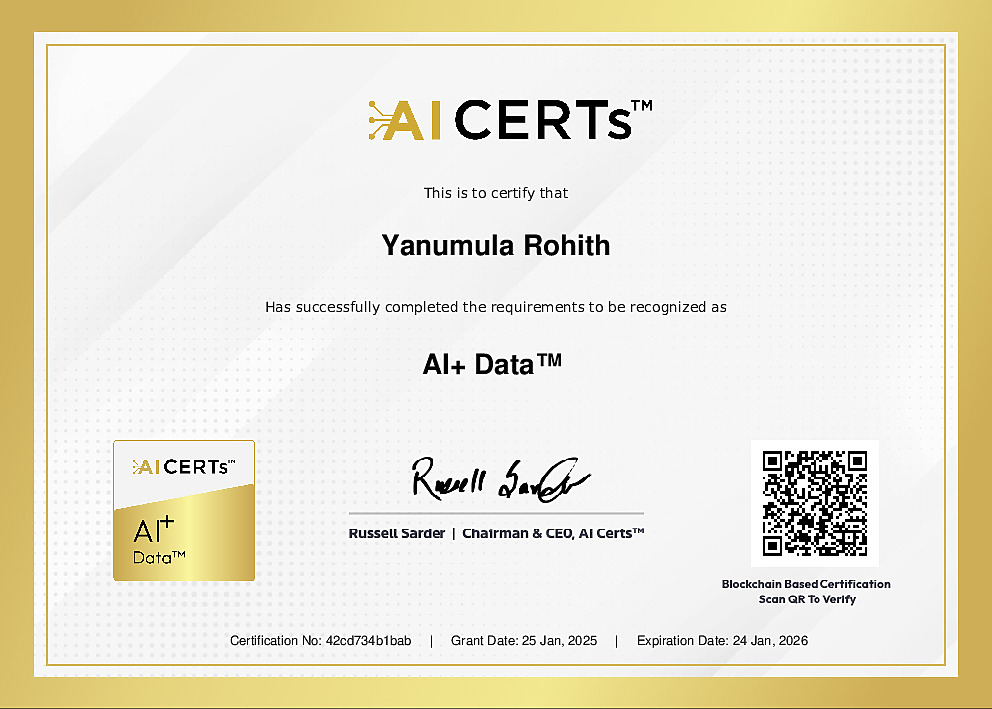AI+ Data™
AT-120
Mastering AI, Maximizing Data: Your Path to Innovation- Core Concepts Covered: Data Science foundations, Python, Statistics, and Data Wrangling
- Advanced Topics: Dive into Generative AI, Machine Learning, and Predictive Analytics
- Capstone Application: Solve real-world problems like employee attrition with AI
- Career Readiness: Develop skills for AI-driven data science roles with hands-on mentorship
Why This Certification Matters
At a Glance: Course + Exam Overview
- Instructor-Led: 5 days (live or virtual)
- Self-Paced: 40 hours of content

Who Should Enroll?
Data Analysts & Scientists: Enhance data analysis capabilities using AI for predictive modeling and decision-making.
Business Intelligence Professionals: Leverage AI to uncover insights, trends, and opportunities in complex data sets.
IT Specialists & System Integrators: Implement AI-powered solutions to optimize data management and infrastructure.
Data Engineers: Design and develop AI-driven data pipelines and architectures for scalable solutions.
Students & New Graduates: Build valuable AI and data science skills to thrive in an increasingly data-driven world.
Industry Growth: Fueling Data-Driven Decision Making Across All Industries
- The global AI data science market is projected to expand at a CAGR of 37.4% from 2023 to 2030. (Source: Grand View Research)
- AI-powered data analytics is transforming industries such as finance, marketing, and retail, driving innovation in data processing and decision-making.
- The adoption of AI-enhanced data solutions is accelerating, with organizations utilizing AI for real-time data analysis, predictive insights.
- AI-driven automation is becoming critical for data-intensive industries, streamlining processes and improving operational efficiency across sectors.
- AI in data science is revolutionizing industries like e-commerce, supply chain management, and customer service by enhancing data-driven decision-making.

Skills You’ll Gain
- Data Visualization Techniques
- Data Quality and Bias Mitigation
- Deep Learning for Data Processing
- Statistical Modeling
- Big Data Technologies
What You'll Learn
- Course Introduction
- 1.1 Introduction to Data Science
- 1.2 Data Science Life Cycle
- 1.3 Applications of Data Science
- 2.1 Basic Concepts of Statistics
- 2.2 Probability Theory
- 2.3 Statistical Inference
- 3.1 Types of Data
- 3.2 Data Sources
- 3.3 Data Storage Technologies
- 4.1 Introduction to Python for Data Science
- 4.2 Introduction to R for Data Science
- 5.1 Data Imputation Techniques
- 5.2 Handling Outliers and Data Transformation
- 6.1 Introduction to EDA
- 6.2 Data Visualization
- 7.1 Introduction to Generative AI Tools
- 7.2 Applications of Generative AI
- 8.1 Introduction to Supervised Learning Algorithms
- 8.2 Introduction to Unsupervised Learning
- 8.3 Different Algorithms for Clustering
- 8.4 Association Rule Learning with Implementation
- 9.1 Ensemble Learning Techniques
- 9.2 Dimensionality Reduction
- 9.3 Advanced Optimization Techniques
- 10.1 Introduction to Data-Driven Decision Making
- 10.2 Open Source Tools for Data-Driven Decision Making
- 10.3 Deriving Data-Driven Insights from Sales Dataset
- 11.1 Understanding the Power of Data Storytelling
- 11.2 Identifying Use Cases and Business Relevance
- 11.3 Crafting Compelling Narratives
- 11.4 Visualizing Data for Impact
- 12.1 Project Introduction and Problem Statement
- 12.2 Data Collection and Preparation
- 12.3 Data Analysis and Modeling
- 12.4 Data Storytelling and Presentation
- 1. Understanding AI Agents
- 2. Case Studies
- 3. Hands-On Practice with AI Agents
Tools You'll Explore

Google Colab
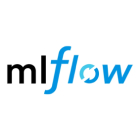
MLflow

Alteryx
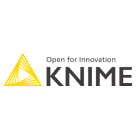
KNIME
Prerequisites
- Basic knowledge of computer science and statistics (beneficial but not mandatory).
- Keen interest in data analysis.
- Willingness to learn programming languages such as Python and R.
Exam Details
Duration
90 minutes
Passing Score
70% (35/50)
Format
50 multiple-choice/multiple-response questions
Delivery Method
Online via proctored exam platform (flexible scheduling)
Exam Blueprint
- Foundations of Data Science – 5%
- Foundations of Statistics – 5%
- Data Sources and Types – 6%
- Programming Skills for Data Science – 10%
- Data Wrangling and Preprocessing – 10%
- Exploratory Data Analysis – 12%
- Generative AI Tools for Deriving Insights – 6%
- Machine Learning – 10%
- Advance Machine Learning – 10%
- Data-Driven Decision-Making – 10%
- Data Storytelling – 6%
- Capstone Project - Employee Attrition Prediction – 10%
Choose the Format That Fits Your Schedule
What’s Included (One-Year Subscription + All Updates):
- High-Quality Videos, E-book (PDF & Audio), and Podcasts
- AI Mentor for Personalized Guidance
- Quizzes, Assessments, and Course Resources
- Online Proctored Exam with One Free Retake
- Comprehensive Exam Study Guide
- Hands-on Labs
Instructor-Led (Live Virtual/Classroom)
- 5 days of intensive training with live demos
- Real-time Q&A, peer collaboration, and hands-on labs
- Led by AI Certified Trainers and delivered through Authorized Training Partners
Self-Paced Online
- ~40 hours of on-demand video lessons, e-book, podcasts, and interactive labs
- Learn anywhere, anytime, with modular quizzes to track progress
Discover Your Ideal Role-Based Certifications and Programs!
Not sure which certifications to go for? Take our quick assessment to discover the perfect role-based certifications and programs tailored just for you.
Get CertifiedFrequently Asked Questions
The certification covers Data Science Foundations, Statistics, Programming, and Data Wrangling, along with advanced subjects such as Generative AI and Machine Learning.
The certification provides participants with the necessary tools and skills to handle complex data challenges, such as cleaning, transforming, and analyzing data.
Graduates of the AI+ Data™ certification program can pursue roles such as Data Scientist, Machine Learning Engineer, Data Analyst, AI Consultant, and other data-driven positions.
Participants will gain skills in data analysis, machine learning, data visualization, data wrangling, and predictive analytics, along with proficiency in Python and R.
Yes, the AI+ Data™ certification is designed to be flexible and can be pursued while working full-time. The course materials are available online.

